
Early Life and Humble Beginnings in London
Jessica Tandy was born on June 7, 1909, in Hackney, London, England, to Jessie Helen Horspool and Harry Tandy, a traveling salesman. From a young age, she exhibited a natural aptitude for performance, and by her teenage years, she was already immersed in stage acting. Despite facing personal tragedy early—her father died when she was just 12—Tandy pursued acting with unwavering commitment. Her earliest years on the London stage in the 1920s and 1930s were filled with promise, and her classical training allowed her to master Shakespearean roles with great nuance.
By the time she was 18, Jessica had already debuted in London’s West End, and she soon became known for her thoughtful, emotionally intelligent performances. However, as the looming specter of World War II and life circumstances changed her trajectory, she would eventually make the leap to America—a move that would define her career for decades to come.
Hollywood and a Transatlantic Reinvention
Tandy moved to the United States in the early 1940s, following the dissolution of her first marriage to British actor Jack Hawkins. In New York, she met Canadian actor Hume Cronyn, who would become her second husband and lifelong creative partner. Their marriage, which began in 1942, marked the start of one of the most celebrated artistic collaborations in American theater and film.
Though she found limited roles in Hollywood at first, Jessica never stopped performing on stage, often to critical acclaim. While younger actresses were often prioritized in film, Jessica quietly built an unparalleled reputation in the American theater world. Her Broadway credits include legendary performances in productions such as A Streetcar Named Desire, where she originated the role of Blanche DuBois, winning the 1948 Tony Award.
For decades, she and Hume Cronyn starred together in multiple plays and television productions. Their chemistry, both on and off stage, helped create a new mold for portraying older characters with vitality and complexity.
Late-Career Renaissance and “Fried Green Tomatoes”

Although Jessica Tandy had long been respected in theatrical circles, her true Hollywood stardom did not come until her 70s and 80s—an extraordinary accomplishment in an industry often fixated on youth. In 1989, she won the Academy Award for Best Actress for her iconic performance in Driving Miss Daisy at the age of 80, making her the oldest actress at the time to receive that honor.
Just two years later, in 1991, she starred as Ninny Threadgoode in Fried Green Tomatoes, a film that would forever link her name with themes of memory, resilience, and female friendship. Her portrayal of Ninny—a spirited, elderly woman in a nursing home who shares vivid stories of the past—captivated audiences. Tandy’s warmth, mischief, and wisdom brought Ninny to life in a way no one else could.
Ninny’s tales of Ruth, Idgie, and the Whistle Stop Café form the narrative backbone of the film. Tandy’s performance is the emotional anchor—guiding the transformation of Evelyn (played by Kathy Bates), while also connecting viewers to a broader story about Southern history, loss, love, and empowerment.
The role showcased everything that defined Tandy’s career: emotional depth, wit, grace, and a powerful ability to portray complex women with dignity. Critics and fans alike praised her performance as one of the most memorable of the decade.
The Power of Collaboration with Hume Cronyn
Jessica Tandy and Hume Cronyn were more than just spouses; they were a creative unit. Together, they appeared in numerous stage and screen productions over their 52-year marriage, including Cocoon (1985), The Gin Game (for which she won a second Tony Award in 1978), and Batteries Not Included (1987). Their dynamic onscreen and stage partnership was characterized by deep respect, humor, and remarkable timing.
They were among the first acting couples to successfully navigate a lifelong working relationship, maintaining their individuality while supporting one another artistically. Their success helped pave the way for more diverse and mature stories in mainstream media.
Later Years and Legacy
Jessica Tandy continued working until nearly the end of her life. She was diagnosed with ovarian cancer in 1990 but continued to act despite health challenges. Her final film role came in Camilla (1994), released shortly before her death.
She passed away on September 11, 1994, at the age of 85, leaving behind a towering legacy in both stage and screen. Her death marked the end of an era, but her work—particularly her roles later in life—continues to inspire actors, especially women, to see age not as a limitation, but as an asset.
Jessica Tandy’s ability to embody resilience, complexity, and elegance made her a trailblazer. Whether portraying Blanche DuBois in her youth or Ninny Threadgoode in her eighties, she refused to be typecast. Her career challenged the industry’s narrow definitions of beauty, relevance, and importance.
Influence on Future Generations
Jessica Tandy is now remembered not just for her awards, but for her authenticity and courage in taking on roles that mattered. Her performances demonstrated that women’s stories are worth telling at every stage of life. Actresses like Helen Mirren, Judi Dench, and Frances McDormand have cited Tandy as an influence—proof of how deeply her work resonated across generations.
Her portrayal of Ninny Threadgoode, in particular, remains one of the most beloved in modern film. Fans of Fried Green Tomatoes still quote her lines, and many cite her scenes as life-changing. Her ability to command the screen without overshadowing others was a rare gift.
Jessica Tandy was not just an actress; she was a force of nature who refused to fade into the background. Through determination, quiet strength, and immense talent, she carved out a career that defied ageist norms and touched millions. As Ninny Threadgoode, she reminded us of the power of stories to connect generations. As Jessica Tandy, she reminded Hollywood that greatness knows no age.
